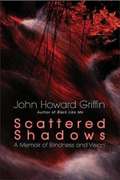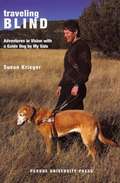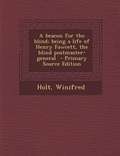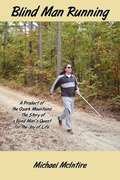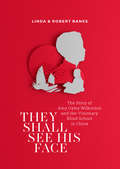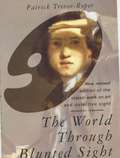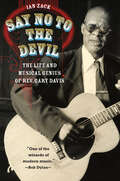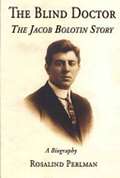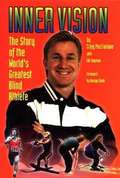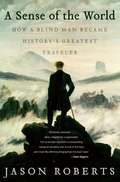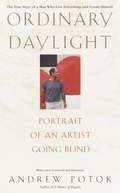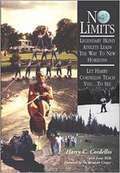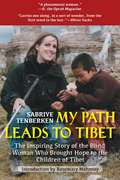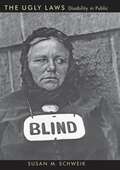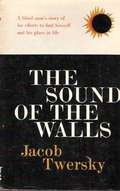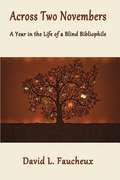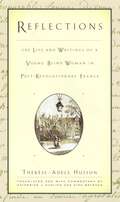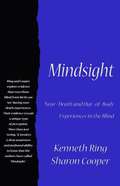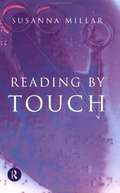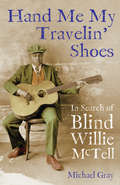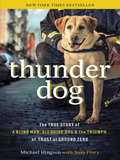Special Collections
Blindness and Visual Impairment Special Collection
Description: A collection featuring biographies, memoirs, fiction and non-fiction by and about members of the blind community. #disability
- Table View
- List View
Scattered Shadows
by John Howard GriffinThis extraordinary chronicle from the author of "Black Like Me" about his loss of sight is a powerful testament to the human spirit. Edited and introduced by Robert Bonazzi
Traveling Blind
by Susan KriegerKrieger (feminist studies, Stanford U.) recounts her experiences as a newly blind person learning to navigate with her guide dog.
A Beacon for the Blind
by Winifred HoltA biography of Henry Fawcett. The story of his life as it is to be told in this book will give ample illustrations of his fortitude and his perseverance.
Blind Man Running
by Michael McintireAutobiography of a blind man's journey through life as a traveling musician
They Shall See His Face
by Robert Banks and Linda BanksAmy Oxley Wilkinson was arguably the most widely known female Australian missionary in China and the West in the early 20th century. She was the great granddaughter of colonial chaplain Samuel Marsden and granddaughter of celebrated explorer John Oxley. After rescuing an abandoned blind boy, she founded an innovative Blind Boys School in Fuzhou which is now a major institution in Fujian Province. Her husband Dr George Wilkinson set up the city’s first hospital and introduced a program to address the pervasive curse of opium addiction.
Amy’s holistic and vocational approach to disability education brought her national and later international recognition. In 1920, the president of the new Chinese republic awarded her the Order of the Golden Grain, the highest honour a foreigner could receive. Two years later, Amy and the School’s brass band were presented to Queen Mary in England.
Amy’s story highlights the significance of Australia’s contribution to the development of early modern China and is a challenge to anyone committed to making their life count for others.
What Color is the Sun
by Kenneth JerniganA Kernel Book, this has life stories from 14 blind people.
The World Through Blunted Sight
by Patrick Trevor-RoperA British ophthalmologist discusses his impressions of visually-impaired artists, including a number of the Impressionists.
Say No to the Devil
by Ian ZackWho was the greatest of all American guitarists?
You probably didn't name Gary Davis, but many of his musical contemporaries considered him without peer. Bob Dylan called Davis "one of the wizards of modern music. " Bob Weir of the Grateful Dead--who took lessons with Davis--claimed his musical ability "transcended any common notion of a bluesman. " And the folklorist Alan Lomax called him "one of the really great geniuses of American instrumental music. " But you won't find Davis alongside blues legends Robert Johnson and Muddy Waters in the Rock and Roll Hall of Fame.
Despite almost universal renown among his contemporaries, Davis lives today not so much in his own work but through covers of his songs by Dylan, Jackson Browne, and many others, as well as in the untold number of students whose lives he influenced.
The first biography of Davis, Say No to the Devil restores "the Rev's" remarkable story. Drawing on extensive research and interviews with many of Davis's former students, Ian Zack takes readers through Davis's difficult beginning as the blind son of sharecroppers in the Jim Crow South to his decision to become an ordained Baptist minister and his move to New York in the early 1940s, where he scraped out a living singing and preaching on street corners and in storefront churches in Harlem.
There, he gained entry into a circle of musicians that included, among many others, Lead Belly, Woody Guthrie, and Dave Van Ronk. But in spite of his tremendous musical achievements, Davis never gained broad recognition from an American public that wasn't sure what to make of his trademark blend of gospel, ragtime, street preaching, and the blues. His personal life was also fraught, troubled by struggles with alcohol, women, and deteriorating health.
Zack chronicles this remarkable figure in American music, helping us to understand how he taught and influenced a generation of musicians.
The Blind Doctor
by Rosalind PerlmanJacob Bolotin was born blind to poor Jewish parents in Chicago in 1888. Rejecting the conventional wisdom of his time, he was determined to "be of use" in the world. He learned Braille and developed an uncanny sense of touch and hearing that would later make him one of the top heart and lung specialists in the city. He fought his way into and through the Chicago College of Medicine, graduated with honors at twenty-four, and became the world's first totally blind physician fully licensed to practice medicine.
Dr. Jacob Bolotin was a pioneer in raising the awareness of the world to the plight of the blind and the need for treating people with disabilities as capable and productive citizens. He died in 1924; he was only thirty-six years old. Five thousand people attended his funeral.
Inner Vision
by Craig Macfarlane and Gib TwymanCraig MacFarlane lost his sight at age 2 and went on to become not only the world's greatest blind athlete, but a much-sought-after motivational speaker. His message is PRIDE -- Perseverance, Respect, Individuality, Desire and Enthusiasm.
A Sense of the World
by Jason RobertsA biography of James Holman (1786-1857). James Holman was a 19th-century British naval officer who became blind at 25, but nevertheless became the greatest traveler of his time. With little money, and long before motorized conveyances made travel easy or popular, James Holman independently traveled over a quarter of a million miles, visiting more than 200 distinct cultures. Be forewarned, this book also contains some rather graphic and disturbing descriptions of the treatment of the Blind in the 19th century.
Ordinary Daylight
by Andrew PotokAndrew Potok is an intense, vigorous, sensual man--and a gifted painter. Then, passing forty, he rapidly begins to go blind from an inherited eye disease, retinitis pigmentosa. Depressed and angry, he rages at the losses that are eradicating his life as an artist, his sources of pleasure, his competence as a man. He hates himself for becoming blind. But as he will ultimately discover, and as this remarkable memoir recounts, it is not the end of the world. It is the beginning.
his the story of Potok's remarkable odyssey out of despair. He attempts to come to terms with his condition: learning skills for the newly blind, dealing with freakish encounters with the medical establishment, going to London for a promised cure through a bizarre and painful "therapy" of bee stings. He wrestles with the anguish of knowing that his daughter has inherited the same disease that is stealing his own eyesight. And then, as he edges ever closer to complete blindness, there comes the day when he recognizes that the exhilaration he once found in the mix of paint and canvas, hand and eye, he has begun to find in words.
By turns fierce, blunt, sexy, and uproariously funny, Andrew Potok's memoir of his journey is as shatteringly frank as it is triumphant.
No Limits
by Harry C. Cordellos and Janet WellsImagine a blind person water-skiing, golfing, running a marathon, and even diving. Harry Cordello did not let his blindness limit his activity. Instead he asked himself "Why not"?
My Path Leads to Tibet
by Sabriye Tenberken and Rosemary MahoneyWhile studying Chinese and Asian civilizations in college, Sabriye Tenberken was stunned to learn that in Tibet blind children were living in appalling conditions--shunned by society, abandoned, and left to their own devices. Sabriye, who had lost her sight at the age of twelve as the result of a retinal disease, promised herself early on that she would never allow her blindness to turn her into an invalid. When she heard of a place where sightlessness was practically akin to leprosy, the decision was instant: she would go to Tibet to help these children.
Armed with nothing but her conviction and determination, she single-handedly devised a Tibetan Braille alphabet and opened the first school for the blind in Tibet, with only a handful of students. From its modest beginnings, that school has grown into a full-fledged institution for visually impaired people of all ages. In this updated edition of My Path Leads to Tibet, Sabriye, shares the inspiring story of how she shone an unlikely light in a dark place.
The Blind In Industry
by Ben PurseA brief outline of the issues facing the organizations and individuals interested in employment of the blind, sheltered shops, industry, women workers, education, college certifications, teachers.
The Ugly Laws
by Susan M. SchweikThe murky history behind municipal laws criminalizing disabilityIn the late-nineteenth and early-twentieth centuries, municipal laws targeting "unsightly beggars" sprang up in cities across America. Seeming to criminalize disability and thus offering a visceral example of discrimination, these “ugly laws” have become a sort of shorthand for oppression in disability studies, law, and the arts.In this watershed study of the ugly laws, Susan M. Schweik uncovers the murky history behind the laws, situating the varied legislation in its historical context and exploring in detail what the laws meant. Illustrating how the laws join the history of the disabled and the poor, Schweik not only gives the reader a deeper understanding of the ugly laws and the cities where they were generated, she locates the laws at a crucial intersection of evolving and unstable concepts of race, nation, sex, class, and gender. Moreover, she explores the history of resistance to the ordinances, using the often harrowing life stories of those most affected by their passage. Moving to the laws’ more recent history, Schweik analyzes the shifting cultural memory of the ugly laws, examining how they have been used—and misused—by academics, activists, artists, lawyers, and legislators.
The Sound of the Walls
by Jacob TwerskyAs a small child in Poland, Jacob Twersky contracted an illness which left him almost totally blind. His parents hoped that a doctor in the United States could restore their son's sight, and this hope spurred them to emigrate in the mid-1920s. Twersky describes his childhood in Poland and Brooklyn, his years attending a resource room for blind children and a regular high school, and his eventual decision to enroll at a school for the blind. His struggle to accept his blindness is a theme throughout the book, threading its way through his college years, his struggle to find a teaching position, and his courtship and marriage.
Across Two Novembers
by David Faucheux
Friends and family. Restaurants and recipes. Hobbies and history. TV programs the author loved when he could still see and music he enjoys. The schools he attended and the two degrees he attained. The career that eluded him and the physical problems that challenge him. And books, books, books: over 230 of them quoted from or reviewed. All in all, an astonishing work of erudition and remembrance.
Reflections
by Therese-Adèle HussonIn the 1820s, several years before Braille was invented, Therese-Adele Husson, a young blind woman from provincial France, wrote an audacious manifesto about her life, French society, and her hopes for the future. Through extensive research and scholarly detective work, authors Catherine Kudlick and Zina Weygand have rescued this intriguing woman and the remarkable story of her life and tragic death from obscurity, giving readers a rare look into a world recorded by an unlikely historical figure. Reflections is one of the earliest recorded manifestations of group solidarity among people with the same disability, advocating self-sufficiency and independence on the part of blind people, encouraging education for all blind children, and exploring gender roles for both men and women. Resolutely defying the sense of "otherness" which pervades discourse about the disabled, Husson instead convinces us that that blindness offers a fresh and important perspective on both history and ourselves.In rescuing this important historical account and recreating the life of an obscure but potent figure, Weygand and Kudlick have awakened a perspective that transcends time and which, ultimately, remaps our inherent ideas of physical sensibility.
Mindsight
by Kenneth Ring and Sharon CooperRing and Cooper explore evidence that even those blind from birth can "see" during near-death experiences. Their evidence reveals a unique type of perception. More than just "seeing", it involves a deep awareness and profound ability to know that the authors have called "Mindsight".
This volume is a ground-breaking work in the field of near-death studies. It investigates the astonishing claim that blind persons, including those blind from birth, can actually "see" during near-death or out-of-body episodes. The authors present their findings in scrupulous detail, investigating case histories of blind persons who have actually reported visual experiences under these conditions.
White Coat, White Cane
by David Hartman and Bernard AsbellThe woman's arthritic fingers feel gnarled and crooked, her knees lumpy rocks. But I can detect no swelling, so I press here, there, trying to rouse an inflamed spot. "What are you doing"she challenges. "You're blind!"
"I'm examining you. Haven't you ever been examined by a blind doctor before?"
She refuses to be humored. "That's silly. What can a blind doctor do?"
"I'm not sure, but we're going to find out..."
When David Hartman, blind since the age of eight, announced his intention to become a doctor, the reactions ranged from sympathy to ridicule. How could he diagnose his patients? Examine them, except by touch? Look through a microscope? Even understand what was being described?
The battle lines were drawn: David and his family on one side, the schools and society on the other. But with an incredible strength of purpose, David Hartman went on to become the first blind person in over 100 years to enter medical school. What is it like to adjust to a world of darkness? David Hartman lets us know bluntly, with real emotion, insight, and humor. He had to relearn the simplest things. He had to overcome mental obstacles that were at times more formidable than the physical ones. Yet he was determined to reach beyond his difficulties to fulfill an impossible dream.
His teachers were helpful, hostile, embarrassed, unsure-and in medical school he had to work twice as hard. The work had to be read to him or translated into Braille. Often he had to rely on a sighted person to confirm his diagnosis, and he needed a nurse to read the patients' charts to him. But he utilized all his other senses to achieve his greatest desire: helping to heal. His journey is a moving and inspirational story for us all.
Reading by Touch
by Susanna MillarThe perceptual, linguistic and cognitive processes involved in sighted reading have been widely studied, but the use of touch raises new issues. Drawing on her research with novice and fluent braille readers, Susanna Millar examines how people initially process braille and how skill with sounds, words, meaning and spelling patterns influence processing. The main focus is on braille, but findings on the "Moon" script, vibrotactile devices, maps and icons are also considered in the context of their practical implications and access to computer technology.
One of the Lucky Ones
by Lucy Ching
Many people might think me unlucky because I am blind, writes Lucy Ching in this poignant autobiography, but I prefer to think of myself as one of the lucky ones.
Indeed, Lucy Ching's achievements despite total blindness would be outstanding in any time and place- especially so in China of the 1930s, where the blind were treated as outcasts and blind children were sometimes sold into slavery by their own families. Lucy Ching was fortunate enough to be kept at home with her parents, but as she reveals in this remarkable memoir, her triumph over her disability was due to her own fierce determination... and to a very special friendship. Under the devoted care of her amah, an illiterate servant woman who was guided only by common sense, intuition and affection for the child, Lucy Ching learned to live in a sighted world, vowing to have the independence and fulfillment of a profession.
As a child, Lucy taught herself to read and write in braille and was allowed to attend school with sighted children. And, quite against the beliefs of her family, she converted to Christianity and made a solemn promise to God that her lifework would be to help the blind. Lucy's unflagging dedication was rewarded with a scholarship to the Perkins School for the Blind in Boston, where she received the special training which has enabled her to carry out her promise.
My life could have been spent in enforced idleness and isolation, observes Lucy Ching, cut off from other people and their lives and problems. But I was luckier than that. God had other plans for me.
Like Helen Keller, she found herself, her work and her God through affliction. Today Lucy Ching is a social worker in Hong Kong, where she works with the blind as well as other handicapped people.
Hand Me My Travelin' Shoes
by Michael GrayEvoking the turbulent past of the subject's time and place, this odyssey to rural Georgia peels back the many layers of Blind Willie McTell's compelling, occasionally shocking, but ultimately uplifting story.
Portraying him as one of the most gifted artists of his generation, this account uncovers the secrets of McTell's ancestry, the hardships he suffered--including being blind from birth--and the successes he enjoyed.
Traveling throughout the South and beyond, this personal and moving journey unearths a lost world of black music, exploring why he drifted in and out of the public eye, how he was "rediscovered" time and again through chance meetings, and why, until now, so little has been written about the life of this extraordinary man.
Part biography, part travelogue, part social history, this atmospheric, unforgettable tale connects the subject's life to the tumultuous sweep of history, exploding every stereotype about blues musicians and revealing a vulnerable milieu of poverty and discrimination, demonstrating that little may have changed in the Deep South, even today.
Thunder Dog
by Larry King and Michael Hingson and Susy FloryFaith. Trust. Triumph.
"I trust Roselle with my life, every day. She trusts me to direct her. And today is no different, except the stakes are higher." ?Michael Hingson
First came the boom?the loud, deep, unapologetic bellow that seemed to erupt from the very core of the earth. Eerily, the majestic high-rise slowly leaned to the south. On the seventy-eighth floor of the World Trade Center's north tower, no alarms sounded, and no one had information about what had happened at 8:46 a.m. on September 11, 2001?what should have been a normal workday for thousands of people. All that was known to the people inside was what they could see out the windows: smoke and fire and millions of pieces of burning paper and other debris falling through the air.
Blind since birth, Michael couldn't see a thing, but he could hear the sounds of shattering glass, falling debris, and terrified people flooding around him and his guide dog, Roselle. However, Roselle sat calmly beside him. In that moment, Michael chose to trust Roselle's judgment and not to panic. They are a team. Thunder Dog allows you entry into the isolated, fume-filled chamber of stairwell B to experience survival through the eyes of a blind man and his beloved guide dog. Live each moment from the second a Boeing 767 hits the north tower, to the harrowing stairwell escape, to dodging death a second time as both towers fold into the earth.
It's the 9/11 story that will forever change your spirit and your perspective. Thunder Dog illumiates Hingson's lifelong determination to achieve parity in a sighted world, and how the rare trust between a man and his guide dog can inspire an unshakable faith in each one of us.
